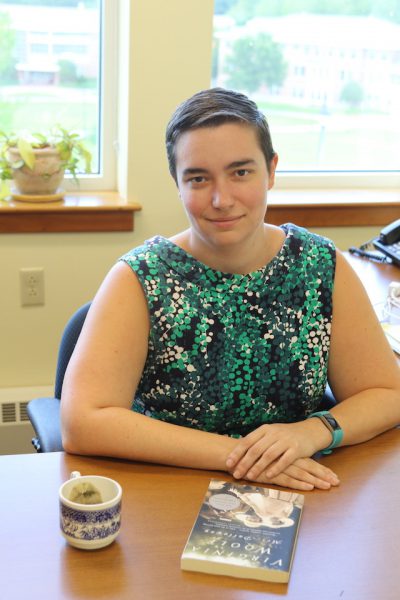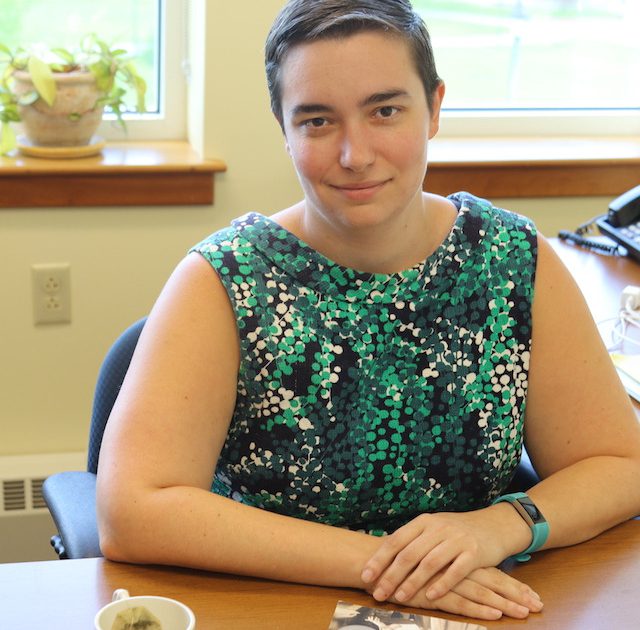“What do I really love about a small college? I get to teach and write for lots of different genres,” explains Dr. Lindsay Gail Gibson as she sips a cup of tea in her office. Framed prints of Virginia Woolf book covers line the wall above her desk—Mrs. Dalloway, To the Lighthouse, A Room of One’s Own, and The Waves. Bright green plants neatly spaced on her window sill grow in various vessels—a ceramic brown pot, a clear plastic container, a glass jar.

Dr. Gibson, who joined the College as an assistant professor of English in 2016, has assumed the role of director of the writing and publishing major, replacing retired long-time director Ed Rielly. While her specialty is the novel (English Classics and British Literature), she also teaches Nonfiction Prose. She writes poetry and pens reviews for contemporary fiction. “It’s important to be involved in different kinds of writing, different modes, for different audiences,” she says. She publishes for the scholarly community, for the general public, and for the tight-knit poetry press circuit.
Dr. Gibson particularly enjoys narrative theory—examining how humans tell stories to make sense of their experiences and how the literary styles that authors employ to convey meaning to readers. For example, during the 19th century, lighting advanced from candles to gas to electricity, changing daily rhythms at workplaces and at homes. Dr. Gibson’s thesis at Columbia University explored how authors during this time period used obsolete forms of light to express character motivations, diving into the tension between daylight and artificial light.
This erudite attention to literary devices can also be found in her reviews of contemporary fiction, which have garnered national exposure (such as “Helen DeWitt’s Philological Fictions,” in the Los Angeles Review of Booksand “Inferred meaning: A clever campus novel filtered through linguistic bewilderment” in The Times Literary Supplement).
“I encourage students to not only ask, ‘What does this piece express?’ but also, ‘Who is it for?’ That’s what sets our program apart from creative writing programs. We place an emphasis not just on writing, but on publishing that writing.”
Through researching outlets, students learn to recognize how individual pieces fit together as part of a larger body of work. Even if their future official job titles do not contain the word writer, Dr. Gibson explains that the skills gained from her classes will apply to students in whichever career they choose. “Writing is an essential professional skill. Many employees need to send memos or create PowerPoint presentations and so much of business is conducted over e-mail. It’s a really important part of how you present yourself to the world. Writing skills translate to any job.”
One of Dr. Gibson’s greatest joys comes when a student connects with a book. She remembers that feeling because she fell in love with reading at a young age. “Being inside fictional spaces was transformative. I could enter a different world, a different time, and experience different ways that people think and feel.”
Through formal education she was able to take that passion for reading and fine tune it into a true craft. She began to understand that authors have choices and make intentional decisions to shape their stories. These are skills she now imparts to her students. “We try to move beyond first reactions such as, ‘I liked it or I didn’t like it’ and instead ask, ‘How is this put together?’ If you look at a novel under the microscope, for a close read, you can see that so much happens in every sentence.”
Such detailed observation on a line-by-line basis requires thoughtful and measured attention. Before joining Saint Joseph’s, Dr. Gibson lived in New York City for seven years. While she admits that the Big Apple provided plentiful cultural and literary events to spark creativity, it also supplied distractions. Even a task as simple as walking down a street to purchase an item at a neighborhood store could derail her writing time, due to the city’s nonstop energy. In Maine, she enjoys the concentration that a slower pace of life affords. She can focus more intently on her work and she also has formed close, meaningful relationships with her colleagues and neighbors. In addition to her teaching responsibilities, Dr. Gibson serves as the faculty advisor for e.g., the College’s literary journal, and serves as an advisor for internships.
When not grading papers or preparing for class discussions, you’ll find Dr. Gibson working on a book about Jonathan Franzen, who has been dubbed a “Great American Novelist.” Ironically, Franzen remains pessimistic about the novel’s role—viewing it as almost obsolete. Her manuscript is due next fall when it will, undoubtedly, make its way into the right hands.
